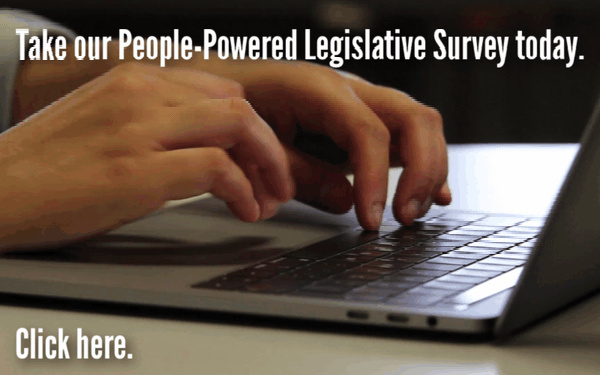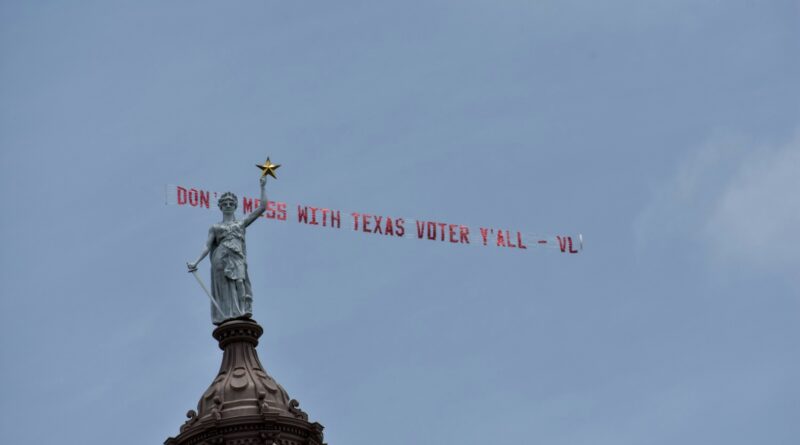House Republicans Make Moves to Arrest Decamping Democrats
True to their word, House Democrats left Texas for Washington D.C. Monday afternoon, landing Monday evening and nearly immediately embarking on a round of interviews with various news outlets.
And nearly immediately, Gov. Greg Abbott responded, calling the actions harmful to the state.
“Texas Democrats’ decision to break a quorum of the Texas Legislature and abandon the Texas State Capitol inflicts harm on the very Texans who elected them to serve,” he said. “The Democrats must put aside partisan political games and get back to the job they were elected to do. Their constituents must not be denied these important resources simply because their elected representative refused to show up to work.”
(Read: Texas House Democrats Preparing to Flee the State)
But words weren’t the only thing directed at the more than 50 lawmakers — Tuesday morning, after determining there was no quorum, Republican House members made moves to order the arrests of the lawmakers who left the state.
Meeting shortly after 10 a.m., the House quickly established that it lacked the two-thirds quorum required to do business, with only 80 of 150 members participating in a test vote.
After issuing a “call of the House,” a second motion demanding the sergeant at arms or “officers appointed by him” to send for the absent legislators “under arrest if necessary” passed as well.
Both measures passed 76-4, with four Democrats who remained behind in Austin voting against it, including State Rep. John Turner (D-Dallas).
That move made the Democrats de facto fugitives.
State Rep. Tony Tinderholt (R-Arlington) then moved to strip the Democrats of their committee leaderships if they were not back in the chamber by noon Wednesday. Discussion followed, and eventually — while speaking with State Rep. Morgan Meyer (R-Dallas), House Speaker Dade Phelan said that current chamber rules did not allow for the action.
Meanwhile, over in the state Senate, nine Democratic senators have also flown the coop, including State Sen. Nathan Johnson (D-Dallas). The Texas Tribune reported Tuesday that Johnson traveled via commercial airline.
“I don’t want these bad bills — that are essentially nothing more than a show for Republican primary — to pass with little observation from the general public,” Johnson told the Tribune. “And no matter how hard and fervently I argue in the Senate, it doesn’t get presented to the public. So let’s shine a spotlight on this stuff.”
At the heart of the controversy are two companion bills — House Bill 3 and Senate Bill 1. Both address what the Republicans call election security, and what Democrats say is an attempt to prevent typically disenfranchised voters from heading to the polls by making it more difficult to do so.
HB 3 made it out of committee as a bill that would seek to stymie local voting efforts like drive-through and 24-hour voting, as well as make it more difficult to vote by mail. It would also improve access for partisan poll watchers and prevent local election officials from proactively sending out applications for prospective voters to request mail-in ballots.
It’s worth noting that Attorney General Ken Paxton’s 2020 voter fraud unit worked for more than 22,000 hours to investigate potential voter fraud in the 2020 election, and closed 16 minor cases.
(Read: Our ongoing coverage of the Texas legislature.)
After House Democrats left at the end of the regular session to deny the body a quorum to pass a similar bill, Abbott in turn vetoed the portion of the state budget that funded the state legislature.
Tuesday morning, the House Democrats held a news conference in Washington D.C., where they remained adamant that they would not return to Texas anytime soon.
State Rep. (and Democratic Caucus chair) Chris Turner said any return would be based also on Abbott reversing the veto that defunded the legislative branch.
Meanwhile, House Democrats held a news conference Tuesday morning in D.C. reiterating their intention to stay outside of the state through the end of the special session.
The Democrats are also challenging Abbott on that move in court. Funding for the legislature will run out on Aug. 31 unless Abbott reverses his veto, or the court rules against it.

Texas history expert and associate director of the SMU Center for Presidential History Brian Franklin said that there are two competing messages about both the actions of the Democrats, and the substance of the bills themselves.
“What I see here is two competing narratives. It’s less about the details of particular laws than it is about stories that each side wants to tell about itself,” he said. “The Democrats are right to argue that voting restrictions and bureaucracy have always tended to limit the vote of people with less power and money, including racial or ethnic minorities. It is also in their self-interest to promote this idea because in general, those votes tend to be Democratic.”
Republicans, however, see the issue as an election security issue.
“On the other hand, Republicans want to promote themselves (and their voting views) as matters of security, law, and order,” he said. “And that matches up with their very present matter of self-interest in continuing to support the narrative that Donald Trump is telling about the 2020 election – that he only lost because of a lack of security, law, and order.”
Tuesday afternoon several advocacy groups made a statement in the sky about the bills, hiring a plane to fly a banner around the State Capitol building in Austin.
The plane was part of a Voting Rights Advocacy Day organized by Voto Latino, Progress Texas, Common Cause Texas, Texas Democratic Party, ACLU Texas, The AFIYA Center, MOVE Texas, Mi Familia Vota, Texas Rising, Texas Civil Rights Project, and other groups.
“Governor Abbott and the Republican-led Texas legislature simply aren’t registering how angry they’re making their constituents by forcing through this package of voter suppression laws,” María Teresa Kumar, Voto Latino’s CEO and president, said. “We’re going to remind them from on the ground, in the sky, and however else necessary, that you’ll regret messing with Texas voters and their fundamental right to have their voice heard in our democracy.”









